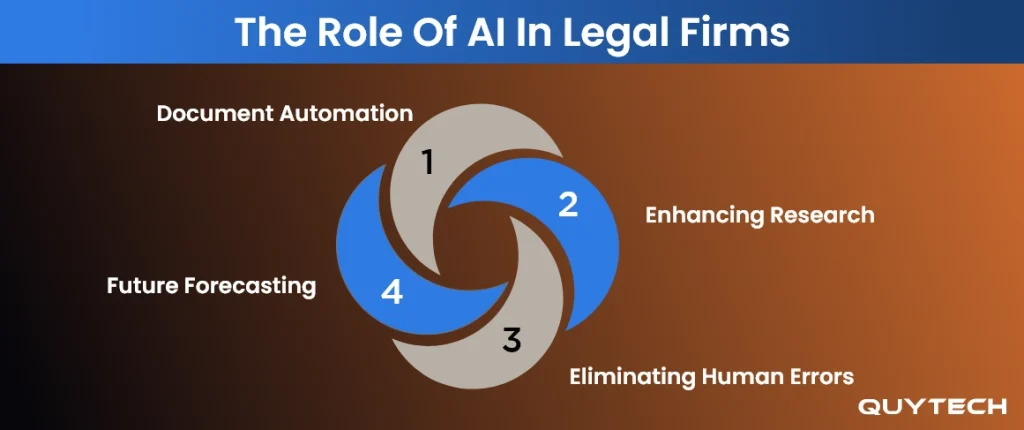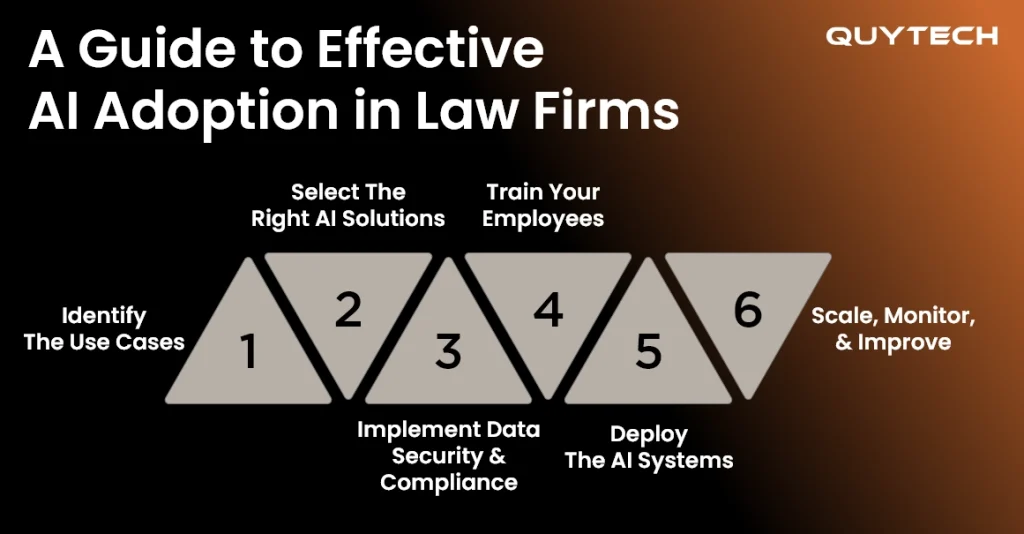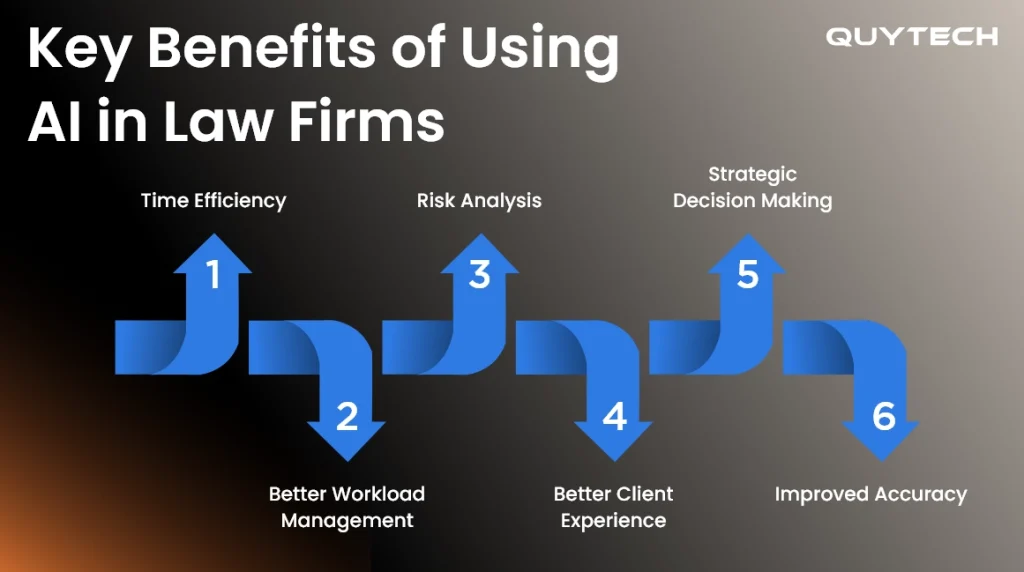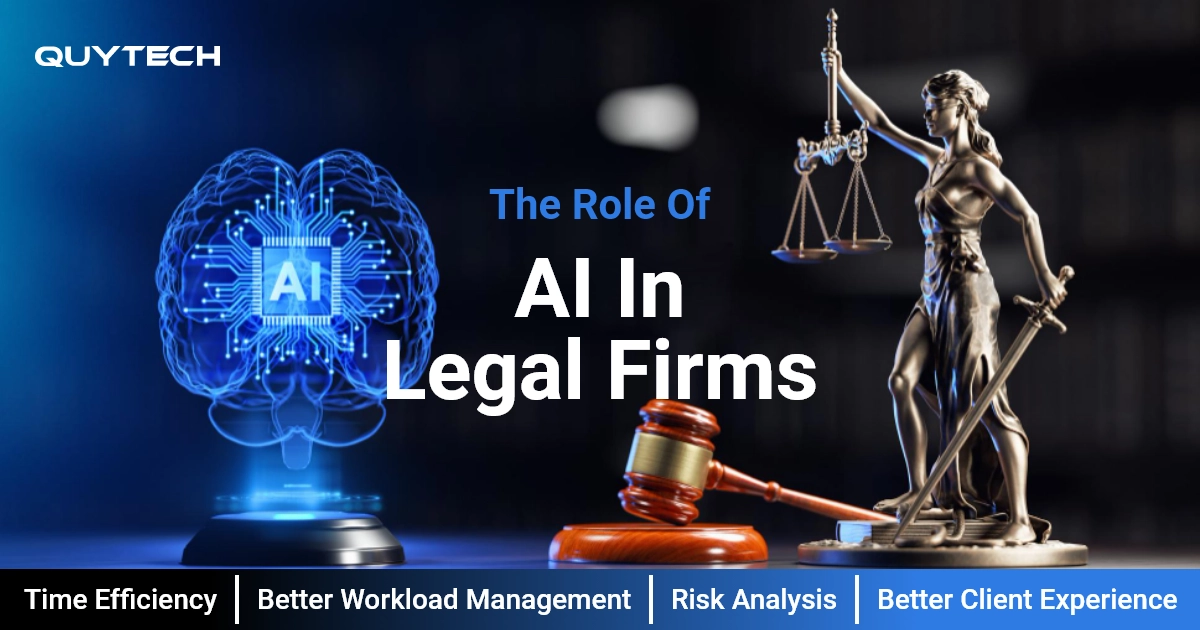We’re all pretty much aware of how rule-bound the legal procedures are. And it’s no surprise that legal professionals have to spend so much time and effort on repetitive and detail-oriented tasks.
The field involves not only time-consuming procedures but also demands strong qualitative judgment. Which is why legal firms are undergoing a smart transformation. And this transformation is brought in by artificial intelligence. In a field so competitive, AI brings a huge sigh of relief by automating repetitive tasks, allowing professionals to focus on critical areas better.
But how exactly does AI in legal firms make this possible? If that’s what you’re wondering, then you are at the right place. Read this blog and find out how AI for legal firms plays a role that brings innovation and transformation.
Key Takeaways:
- The legal AI market is expected to reach USD 3.90 Bn by 2030.
- AI for legal firms automates documents, research, and eliminates errors.
- It boosts efficiency in legal firms through risk, cost, and workflow management.
- AI integration involves defining use cases, choosing secure solutions, and training teams before deployment.
- AI adoption faces hurdles in security, ethics, resistance, and effort balance.
Exploring the Market Potential of AI in the Legal
Let’s start with what we’ve got to back the role of AI in legal firms up:
- According to a report by Grand View Research, the global legal AI market stood at USD 1.45 billion in 2024.
- The report also states that among all legal profession segments, law firms recorded the highest AI adoption.
- The report highlights that the legal AI market is expected to reach about 3.90 billion by 2030.
- It states that the largest share, approximately 46%, was taken by North America in 2024, with the Asia Pacific region growing at the fastest rate.
How AI is Transforming Legal
Artificial intelligence in law practice is giving the manually handled repetitive tasks a makeover. The tasks that once drained legal professionals are now handled within minutes, thanks to AI-powered technologies.
AI for legal firms brings in a blend of advancements like natural language processing, predictive analytics, automation, machine learning, chatbots, and virtual assistants. All these technologies together work collaboratively to finish monotonous tasks efficiently.
The difference that these technologies bring is not just productivity, but also better management.
Tasks like document review, data handling, 24/7 client support, contract management, decision making, and case research, which once took weeks, are managed easily with the help of AI.
This shows how significantly AI in legal firms is bringing a futuristic transformation in the legal field.
You Might Also Like: AI in Product Development: Use Cases, Benefits, Solution
The Role of AI in Legal Firms
Now that you have a rough idea of the changes AI for legal firms brings, let’s dive deeper and understand the role of AI in legal firms:

Document Automation
A prominent role of AI in legal firms is document automation. AI incorporates technologies like natural language processing that are capable of reviewing documents, cases, and contracts. They can even provide summaries and extractions to help professionals review without actually going through them.
Enhancing Research
Research is a part that is very important, but is equally exhausting. AI brings on e-discovery technologies that help legal firms in conducting effective legal research without needing week-long brainstorming sessions. This helps in cutting down the time spent on creating a structure to follow, as AI provides it all.
Eliminating Human Errors
AI for legal firms is capable of reading and understanding various inputs, documents, and cases, without getting tired or losing concentration. This ensures that the analysis, reviews, and similar tasks it performs give accurate results. It does not overlook details or make mistakes like humans do.
Future Forecasting
Predictive analytics plays a very significant role in helping legal firms forecast future outcomes. It does not read documents and cases and give results. It does way more than that. Predictive analytics can go through data and depict trends and patterns. This analysis offers futuristic insights that help legal firms in enhancing their preparedness.
Similar Read: Role of AI in Social Media: Enhancing Use Engagement
A Guide to Effective AI Adoption in Law Firms
Every time legal firms plan to introduce AI technology, the first question that arises is ‘where do we start from?’. Worry no more, because we have answers to your questions. Here is a stepwise breakdown of a guide to effective AI adoption in law firms:

Identify the Use Cases
Define the tasks and areas where you want AI systems to take over. These could be document management, contract review, case tracking, and compliance checks. This helps in providing a roadmap when the development and implementation process begins.
Select the Right AI Solutions
Selecting the AI solutions is a prominent step. You can go for an already built solution for legal firms. These are capable of handling routine legal tasks efficiently. If you want a tailored solution for your firm, then you can consider developing one from scratch.
Implement Data Security and Compliance
Once you have selected the right AI solutions for your legal firm, implement data security and compliance. This ensures that all your data is safe and no third party has access to it.
Train Your Employees
Since it is the employees who will be working with the AI systems, they must be prepared to do so. Train and educate your employees on how to work and collaborate with AI systems effectively.
Deploy the AI Systems
Once both the AI model and your employees are ready, deploy the system in your legal firm. You can start small with a few departments and then scale up if you want to compare the effectiveness.
Scale, Monitor, and Improve
The implementation of AI in legal firms does not end at deployment. AI systems need scaling, maintenance, and updates over time. After deployment, ensure that you scale the system to all the departments, monitor them, and make improvements accordingly.
Read More: The Role of AI in Insurance: Top Use Cases & Future

What are the Key Benefits of Using AI in Law Firms
AI is a technology that enhances the overall operations of firms by adapting to them, making itself a versatile and tailored tool for everyone. Now that we are aware of the capabilities of AI in legal firms, it’s high time to understand the benefits of using AI in law firms:

Time Efficiency
AI in legal firms can automate repetitive tasks like document reviewing, research, and analysis within minutes. Traditionally, these tasks used to take hours of tedious reading and marking, but AI makes such tasks a breeze.
Better Workload Management
With AI managing a significant portion of the workflows in law firms, the workload of the legal professionals reduces. This helps them manage their tasks more efficiently. AI orchestrates the workflows to ensure better management.
Risk Analysis
AI in legal firms utilizes various advanced technologies. One such technology is predictive analytics. When predictive analytics is used in law firms, it helps in assessing the risks by analyzing the information and preventing them on time.
Better Client Experience
Using AI in law firms can significantly enhance the client experience, as artificial intelligence is capable of covering repetitive tasks. This saves a lot of time that the legal professionals would’ve spent on working on those tasks. It allows them to focus better on the clients’ cases.
Strategic Decision Making
AI is capable of analyzing information and providing insights and suggestions based on the patterns and trends depicted. AI-powered insights, when blended with human ideas and strategies, help legal firms make informed decisions.
Improved Accuracy
AI systems are properly trained with relevant data. This enhances their accuracy in delivering the right output. AI in legal firms reduces the chances of making errors. And this accurate response does not need hours; it’s provided in minutes.
You Might Also Like: AI in Fintech: Critical Roles, Benefits, and Use Cases
AI in Legal Firms: Challenges and Considerations
The implementation process of AI for legal firms is a smart step indeed. But, just like any other technology, AI implementation can also face some roadblocks. Let’s uncover some of the common challenges and considerations that legal fields should look out for when integrating AI:
Ethical Challenges
The ethical challenge includes the bias that AI systems may have. AI systems are trained using historical data. This data can be biased and end up giving inaccurate or unfair results.
To tackle this, legal firms should train their AI systems with fresh data. Through this, they can understand and adapt to a variety of different cases and act fairly.
Data Privacy and Security
Another concern that arises when implementing AI in legal firms is the risk of data breaches. This means that unauthorized people are getting access to the data of the firm.
To prevent data privacy and security issues, legal firms should maintain activity logs, supervise access, and follow data encryption.
Resistance to Change
Resistance to change means that the employees may not want to adapt to AI systems, as they may take it as a threat to their jobs. This resistance can also arise if the employees feel skeptical about taking AI’s help for significant and monotonous tasks.
Spreading awareness among employees about how AI is not there to replace but to assist them can help change their resistance towards it. Offering transparency and reasoning behind every response given by AI can help in clearing doubts.
Balance Between AI and Human Effort
A major consideration that arises when integrating AI in law and legal practice is establishing a balance between AI and human effort. Depending too much or too little can lead to imbalance.
Legal firms should ensure that employees depend on AI for routine tasks. And, the decisional and strategic tasks should be covered by professionals only.
Training and Education of Employees
When introducing AI in legal practices, legal firms should provide optimal training and education to their employees. This will ensure that all the employees are aware of how, when, and what to use AI for.
Conclusion
AI for legal firms blends the skills and effort of legal professionals with smart advancements. This brings a powerful transition that helps professionals enhance their productivity and manage workflows effectively.
AI brings in benefits like time and decision-making efficiency, risk analysis, enhanced client experience, improved accuracy, and workload management. This does not just drive automation but also works on multiplying the productivity of legal firms. The adoption of AI in legal firms is not just a flashy tech upgrade but a powerful way to enhance overall management.

FAQs
Yes, when protected with the right data safety protocols. The use of AI in handling sensitive legal data is safe when businesses comply with data protection laws.
AI improves client experience by being available 24/7 to answer their queries, speeding legal processes, and automating routine tasks.
Absolutely, small firms can also benefit from AI implementation as it can cover repetitive tasks, give insights, and help in making informed decisions.
Yes, AI tools are built with consideration of blending with existing management systems. They can integrate with your existing case and document management systems.
